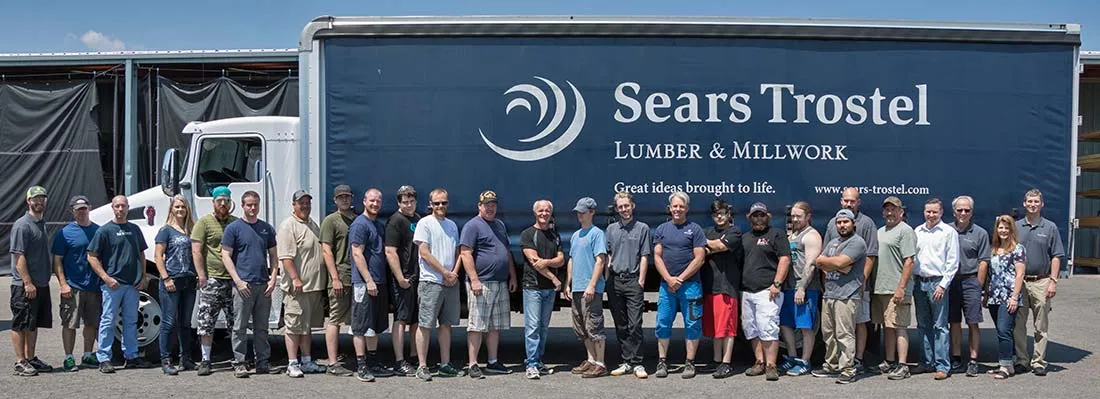Table of Contents
A special series by NAWLA.
With nearly 20 years of HR experience in the wood products industry, I can professionally vouch for the wealth of opportunities available across the sector. As a female, I also can personally attest to the vast potential for women across the sector. Put these insights together, and you get someone with a crystal clear view of just how rewarding a career in wood products can be—for anyone.
Coming from an engineering background, my own story is a testament. After graduating from Southern University and A&M college with a degree in mechanical engineering, I started working in process safety, construction project start-ups, and eventually, cost engineering. Nearly a decade later, on a recommendation from a colleague who was leaving our construction engineering firm to pursue a plant management career at RoyOMartin, I applied for an open HR position at a small utility-pole treating facility owned by the same company. As if crafted just for me, the job called for someone with manufacturing know-how… and that’s how my transition to a new industry and new niche began in 2002. I’ve been with the company ever since, and it’s been a heck of a ride.
It’s also been a different ride every day. In manufacturing, each day brings with it a new challenge, and this is even truer with wood products. So much of what we do comes back to relationships, from how our sales force is able to sell in a tough market by leveraging the connections they’ve cultivated all the way down to, in my case, how HR interacts with employees’ needs. It touches everything from what we consider “normal” circumstances, to the current COVID-19 crisis, to even the aftermath of Hurricane Laura recently. Beyond the unexpected, there is still always something to do—continuous improvement, whether in the manufacturing operations or on the people side. That makes this more than just a job; it makes it a way of life, and a good one at that.
Come One, Come All
Not enough people understand that about our industry: how you can earn a very comfortable living, achieve personal and professional growth, and enjoy career longevity, no matter which level of an organization you find yourself. From a collegiate standpoint, the opportunities are endless. There is practically no major—from accounting to forestry to computer science—that doesn’t have a place somewhere within the wood-products business spectrum. (Okay, there may be a handful, but trust me, they are few and far between!)
However, for students pursuing an engineering major, for example, if they don’t realize this industry’s potential and are unable to align the skills associated with their area of study to wood products, they’ll never even try to make the necessary comparisons when weighing future career tracks. It is paramount, then, that we do more to publicize and share that information with schools. We must be intentional about it.
As much as this industry accommodates so many different majors and fields of study, it’s important to recognize that the opportunities are just as ample—and maybe even that much more rewarding—for someone coming in the door with a high school education but no college degree. Here at RoyOMartin, we’re involved with a program called WoodWorks, which partners with youth who have been studying the industry and the company, but who have also decided that college is not for them. They instead have the opportunity to enter at the manufacturing/production team member level and often wind up better off financially than their counterparts who take the university route, get a business degree, and graduate with student debt.
Workers who enter our business early in their careers often enjoy valuable benefits for their present and future, along with financial freedom with a competitive salary that allows them to become homeowners and pursue other major purchases to meet their needs and desires. Over time, any gaps on salary and benefits compared with other industries close dramatically in the wood-products industry. That, in turn, fosters an enviable level of financial independence and comfort.
Women Welcome
It’s especially important to drive home that message to women, who—despite a perception that this industry is for men only—are equally entitled to benefit from all the sector has to offer. We have so many jobs that need to be filled in manufacturing, and studies from the National Association of Manufacturers (NAM) and others show that women—whether new to the workforce or returning to the industry—have the ability to close the skills gap. But, again, they have to know that those opportunities are there.
This is an area that I have a lot of passion for, and I’m doing what I can to make a difference in whatever small way that I can. Back in 2012, I was honored to be part of the inaugural class of the STEP (Science, Technology, Engineering & Production) Ahead Award recipients. The honor is bestowed by the Manufacturing Institute, an arm of NAM, on women across the country who had development in STEP.
Along the same vein, three years ago RoyOMartin launched its own program to recognize women in the production ranks for their contributions. We also invite young girls from local schools to come in and hear our team members’ stories and take part in Q&A sessions. We’re continuing to evolve that program, because it really does illustrate this aspect of the industry’s success. Last year, it was my event to actually host. We created a video that talks to the girls, as well as the community, about the opportunities for women in manufacturing. One memory that resonates with me, even still, is an interview with one lady who has gone through a divorce since joining the company. Rather than worrying about how to support herself on a single income, she talked about how at that point in her career, she’s able to care for her family better than she was able to do with a spouse.
Her story further underscores how financial independence, technical skill, and a career to be proud of are all here for the taking, whether you’re a man or a woman, whether you get in on the ground floor or complete a degree first, and whether you study business or IT. My own 18-year story in the industry is one out of many others. In my case, I went from HR manager of that small treating facility, to HR manager for the largest plywood-manufacturing facility in North America, to director for that business unit, and to now holding the title of senior director with corporate responsibilities. Too few people, however, realize they can attain that same kind of success in wood products. And that is what makes this industry one of the job market’s best-kept secrets.
It won’t stay that way, however, if I can help it. I will continue to get the word out through involvement with RoyOMartin’s Women in Manufacturing initiatives, participation on NAWLA’s Education Committee, and my current roles as 2020 chair of the Central Louisiana Regional Chamber of Commerce and co-chair of The Louisiana Federation of Advanced Manufacturing Education (Geaux Fame). I can also keep the message going through my active membership in Delta Sigma Theta Sorority, Inc.—which has strong programs engaging youth in educational development—and my recent appointment to the Louisiana Women’s Policy and Research Commission. Please join me and commit to sharing this information to shine a light on the endless opportunities for all in the wood products industry.









